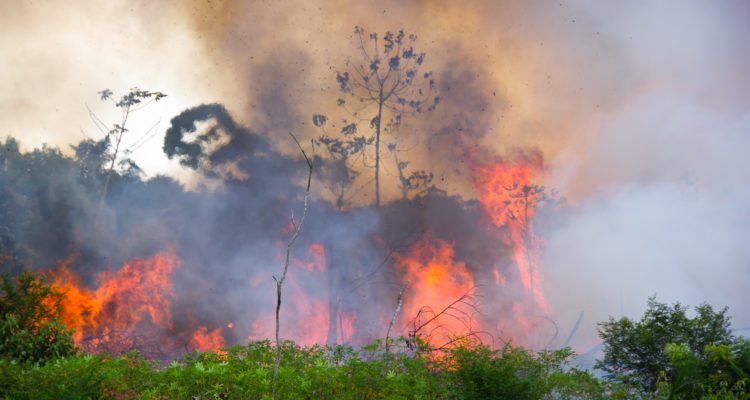◊ By Ecovia Intelligence
Brazil is under the spotlight again as parts of the Amazon are burning. With much of the rainforest being cleared for agriculture, some of the solutions lie with sustainable foods. It is estimated that up to 80% of forests are being cleared by cattle ranchers. Brazil is already the world’s largest beef exporter, shipping 1.6 million tonnes of the same per year. There are calls to stop beef imports from Brazil until there is a moratorium on deforestation. At the G7 Summit, there were threats to halt the EU-Mercosur trade agreement because of the burning Amazon.
The rise in demand for soybeans is also linked to deforestation. Brazil is seeing a surge in exports to China, which has imposed tariffs on American agricultural products. The US-China trade war is making Brazilian growers scale up production. This year, Brazil has overtaken the US to become the world’s largest producer of soybeans. Although soybeans are no longer grown on deforested land, cattle ranchers in the Cerrado region (southern and eastern areas of the rainforest) are moving out to make way for soybean cultivation.
Geopolitics are blamed for fuelling fires in the Amazon but there are also solutions from sustainable foods. The starting point is consumer diets.
Agriculture is a contributor to greenhouse gases, with livestock having the largest share. Reducing meat consumption or switching to plant-based foods will lower demand. Apart from the direct impact on beef sales, it will also reduce the need for soybeans which are a major component of animal feed.
Switching to sustainable meats is also encouraged. A variety of organic, free-range and certified humane meats are now available. Already popular in Europe and North America, such schemes are gaining traction in Brazil, Asia and other parts of the world.
Sustainability schemes such as the Brazilian Roundtable on sustainable livestock also ensure that cattle are not grazed on deforested land. In Brazil, some retail outlets are using electronic tagging to ensure their beef is fully traceable and not produced by rogue ranchers.
There also needs to be greater investment in regional markets. Europe imports significant volumes of soybeans and agricultural commodities, which are used in plant-based foods, as well as, by livestock farmers. By raising soybean production in Europe, food producers will be less reliant on imports. Sustainability standards such as the ProTerra Foundation and Danube Soya also play a role by ensuring traceability in soybean supply chains.
But the biggest change is likely to come from consumer education. Palm oil, also linked to deforestation, has seen a backlash in recent years from consumers who associate it with the endangered orangutan and burning forests. Food companies like Coop (Italy), Iceland (UK) and Barilla (Italy) have responded by replacing palm oil in their products. Consumers are actively looking for ‘palm-free’ products. Launched in 2017, the International Palm Oil Free Certification Trademark now has almost 1,100 certified products.
The prolonged burning of the Amazon could bring about consumer boycotting, with Brazilian beef and agricultural products coming under scrutiny. Sustainable foods can offer solutions but the power is increasingly with ethical consumers.
Major sustainability issues in the food industry, such as plant-based foods, sustainable soya schemes, reforestation and traditional agricultural methods, sustainable meat production, organic supply chains, and ethical consumerism will be featured in upcoming editions of the Sustainable Foods Summit:
Latin American edition: 29-30 November 2019, São Paulo
North American edition: 22-23 January 2020, San Francisco
Asia-Pacific edition: 30-31 March 2020, Singapore
For further information, please visit www.sustainablefoodssummit.com
Ecovia Intelligence (formerly known as Organic Monitor) is a specialist research, consulting and training company focusing on global ethical product industries since 2001



Leave a Reply